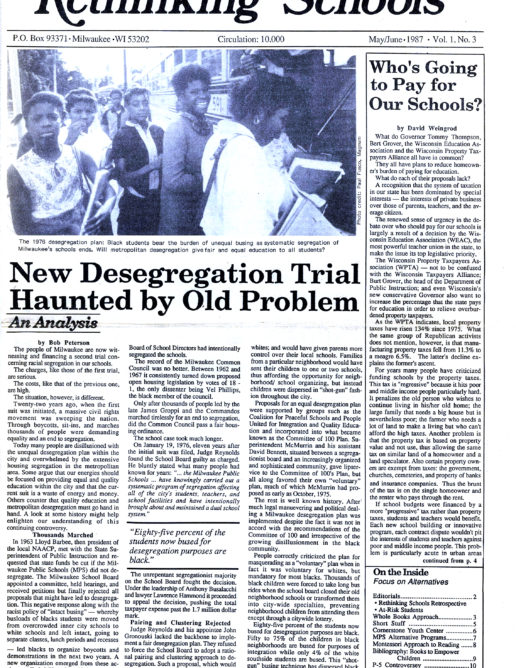At Risk Students: The Question is Why
When over one thousand people gathered at Marshall High School in early April for the all-city conference. Educating At-Risk Students, two very different perspectives emerged.
Much of the program that evening was devoted to praising the Milwaukee Public Schools for its apparently grand success in educating at-risk students. James K. Stewart, representing Reagan’s Department of Justice, went so far as to assert that the Milwaukee school system “serves as a model across our country.” By the time the congratulatory part of the event ended, an impartial observer might have wondered with so much success why the conference had to be held at all. Clearly such praise did not jibe with the statistics: astounding drop-out and suspension rates, the nation’s highest teenage pregnancy rate, and a disturbing disproportionality between the success of white students and to non-white students in MPS.
Suddenly, Dr. Barbara Sizemore, a former Superintendent of Schools of Washington, D.C., woke the crowd up by refusing to address the topic she’d been as-signed and driving instead to the heart of the matter. Rather than patching up the problems with still more special programs, she said, we need to ask ourselves why pertain groups of students – especially black males – consistently end up “at-risk” in our school system, Instead of constructing alternative schools to catch students who don’t succeed in the regular school setting; we need to ask what drives them out of the system in such overwhelming numbers in the first place. Then we need to make the kinds of changes in all classrooms that will make it possible for all children to have an equal opportunity to be educated. Sizemore pointed to school systems that have proven this can be done.
We in Rethinking Schools believe that while a variety of alternative programs in Milwaukee are worth supporting, the focus of discussion about “at-risk” students should be a constructive, critical examination of the policies and structures of the public school system itself. We invite parents, teachers, students, and the larger community to join into this exploration. It is time to rethink our schools.

